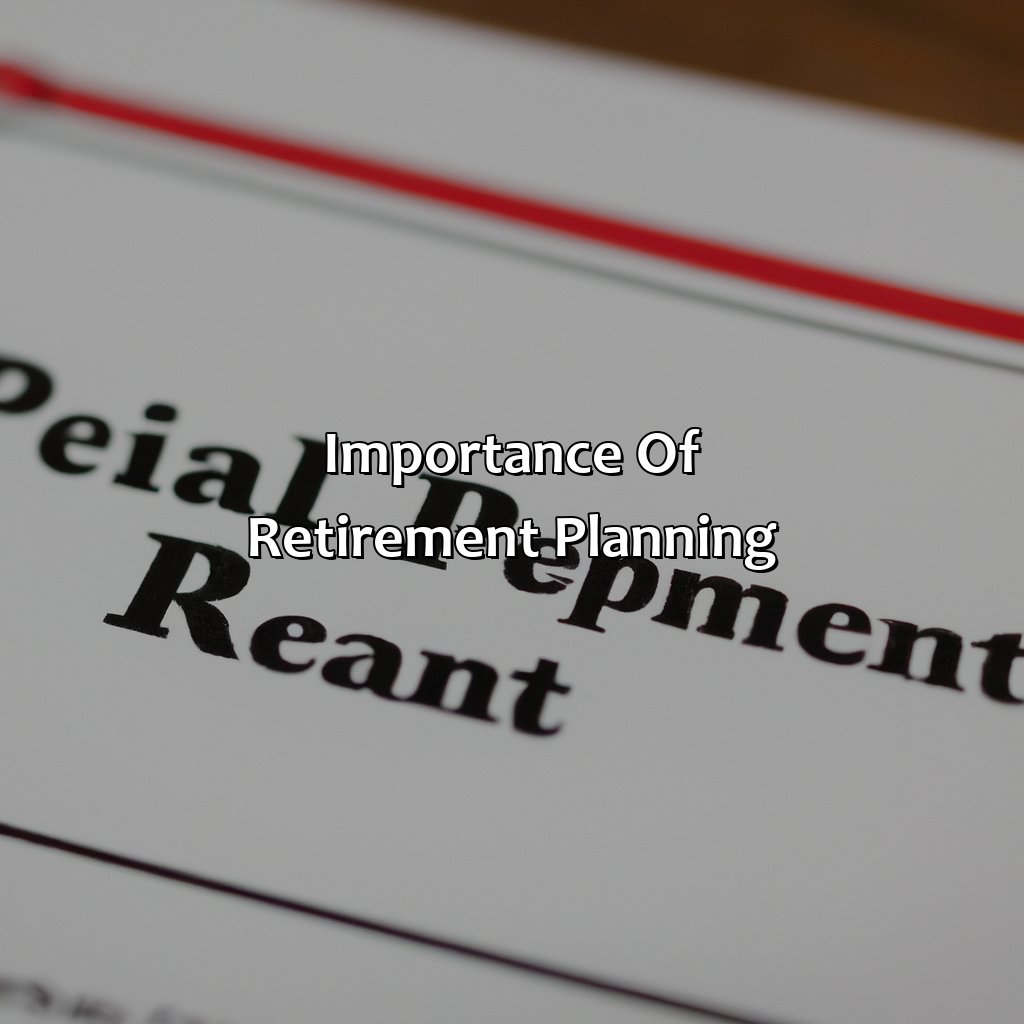Why Is Retirement Planning Important?
Key Takeaway:
- Planning for retirement is important for financial stability in retirement: Building a retirement plan helps ensure a comfortable life in retirement by providing financial stability when other sources of income may not be available.
- Avoiding dependence on social security: depending solely on social security benefits can lead to a lower standard of living in retirement.
- Meeting retirement goals: a retirement plan ensures that life goals can be achieved in retirement, such as traveling or spending time with loved ones.
Are you worried about the financial risks of not having a retirement plan? This article will explore why it’s so important to make retirement planning a priority now. You owe it to yourself to get a secure retirement plan in place.
Importance of Retirement Planning
Gain insight into the significance of retirement planning. It helps you attain Financial Stability in Retirement, ward off Dependence on Social Security, and fulfill Retirement Goals.
To achieve financial stability during retirement, plan ahead! This way, you can avoid depending heavily on social security and reach your retirement goals without financial stress.

Image credits: retiregenz.com by James Woodhock
Financial Stability in Retirement
Having a secure financial future is vital for retired individuals, and planning ahead can ensure Financial Stability During Retirement. Adequate retirement planning guarantees a comfortable lifestyle for retirees and provides peace of mind in old age.
Savings, investments and other assets are factors that influence financial stability in retirement. Implementing proper strategies for managing finances is crucial to ensuring enough funds post-retirement.
Retirement calculations need careful evaluation, including healthcare expenses, insurance costs, and more. Implementing a retirement plan as early as possible helps retirees save more and invest in appropriate resources for future use.
Consider an example where Sarah delayed her retirement planning until she was 50 years old; this led to very limited options of investment due to the scarcity of time left before her expected retiring age. In contrast, Mike started saving at just 25 years old and has been investing consistently since then; he has numerous options available to him when he retires at 60 years old. Proper planning helped Mike achieve his aim of attaining financial stability during his golden years.
Retirement planning is like a life-jacket, you don’t want to be dependent on social security as your only floatation device.
Avoiding Dependence on Social Security
It is crucial to prioritize saving for retirement to avoid relying solely on Social Security benefits for income. Diversifying sources of income can protect against financial instability in retirement. This type of financial planning should include investing in an IRA or 401k plan through a workplace and seeking professional advice. By taking control early, individuals can build up their own financial security and reduce the reliance on potentially unreliable government benefits.
Research shows that social security may not be enough to cover all expenses in retirement, making it necessary to explore more options. Moreover, waiting until retirement to start saving may not provide enough time for investments to compound and grow fully. Therefore, taking action as soon as possible increases the likelihood of having more significant savings by the time you retire. By putting aside a certain percentage of income each year for retirement, individuals can plan ahead and ensure financial stability when they retire.
Beyond setting a specific amount of savings goals, it is essential to have an overarching strategy that aligns with life goals beyond just basic expenses related to housing, medical costs or daily living expenses. It is imperative that individuals understand all aspects of retirement planning like diversification and using tax-advantaged accounts at various stages in life.
In 1983 – For the first time in history, new retirees were taxed on some portion of their Social Security benefits depending on other incomes due instead-of-direct cash handouts affecting millions across America. Retirement Planning became even more crucial than ever before since people had begun to lose faith on-the-reliance-of median social security incomes because no one knew what was going to happen next!
Retirement goals: because it’s never too early to start worrying about how many cats you’ll own in your golden years.
Meeting Retirement Goals
Preparing for the Retirement Years
The journey towards achieving a comfortable retirement involves detailed planning and consideration of a variety of factors, ranging from financial to health-related concerns. Adequate preparation allows individuals to meet their retirement goals, ensuring that they can maintain a desired quality of life during their later years.
To meet retirement goals, starting early with calculated risk investments in stocks and mutual funds can provide higher returns than traditional saving options. Planning a budget will ensure an understanding of how much money is needed to cover basic expenses post-retirement and flexibility to accommodate any economic changes. A key factor is managing debt that will persist after retiring; paying off loans in full before leaving work ensures a stress-free retirement.
Self-assessment is important when considering your own health status, as it lets you plan for any necessary medical care or lifestyle changes. Establishing relationships with qualified healthcare professionals means individuals have support throughout their retirement years, avoiding sudden health issues which could result in large expenses frightening those who are unprepared.
Thus, reaching retirement goals requires careful planning and thoughtful consideration well in advance of the actual day one stops working. By investing wisely, structuring budgets, lessening debts incurred over time leading up to retirement, monitoring personal health status regularly and having an exit strategy that includes contingencies help make sure that you have enough resources available when the time comes to retire.
Your retirement plan should be like an onion, with multiple layers of savings and investments to make sure you’re not crying when it’s time to retire.
Building a Retirement Plan
Creating a retirement plan? It’s essential to include “Understanding Retirement Goals,” “Evaluating Sources of Retirement Income,” and “Estimating Retirement Expenses” to guarantee comfort. To come up with the best plan, understand your goals, income sources and expenses. Then, you’ll be ready for retirement!

Image credits: retiregenz.com by James Arnold
Understanding Retirement Goals
As you plan for retirement, it is important to have a strong understanding of your retirement aspirations. By defining your ‘Retirement Vision‘, you can identify specific goals such as travel, education or legacy planning in order to build strategies that meet your needs. Aligning savings and investments with these targets can help guide your financial decision-making and increase the likelihood of achieving a comfortable retirement lifestyle.
Developing a ‘Retirement Vision‘ starts with envisioning your ideal lifestyle in retirement. Whether it’s pursuing hobbies or passions, traveling the world, or spending more quality time with loved ones, identifying key priorities will help in shaping realistic expectations. Ultimately, financial planning should be driven by one’s unique vision for life post-career.
With increasing longevity and uncertainties regarding government programs like social security, having an effective retirement plan has taken on greater importance than ever before. While every individual’s situation differs, retirement planning remains essential for everyone who desires a financially secure future.
Pro Tip: Having a well-defined vision for your ideal retirement can help maintain clarity and motivation while navigating the process of building a comprehensive plan.
Retirement income sources: like a game of roulette, but with less excitement and fewer chances of winning.
Evaluating Sources of Retirement Income
An analysis of potential income options during retirement is crucial to secure future finances. It involves considering various revenue streams, including social security payments and investments. This assessment helps estimate expenses and determine the requisite amount to save for retirement.
Exploring possible sources of revenue post-retirement is essential when preparing for the golden years. Retirement strategies can involve delaying withdrawals from pension plans, reducing spending, or considering part-time work options. Additionally, assessing retirement assets such as real estate holdings or stock portfolios can help increase income supplements.
Considering annuities or structured settlements as retirement investment vehicles may also prove worthy income providers down the line. These payouts offer steady incremental payments that could curtail unforeseen expenses in advanced age.
Assessing one’s potential income options and minimizing potential financial risks is an important factor in securing a comfortable post-retirement life. For instance, Mr John Smith did not investigate all available sources before retiring and did not have any other income stream apart from his pension plan. However, after inflationary factors took effect, he found his monthly payments insufficient and resorted to a part-time job to supplement his income requirements.
Retirement expenses: a great exercise in guessing, followed by a lifetime of hoping you guessed correctly.
Estimating Retirement Expenses
Planning for your retirement is crucial, and part of that plan should include estimating the expenses you will incur during your post-work years. Anticipating the expenditure can help you to avoid any financial stress in your later life.
To estimate these costs, examine your current expenses carefully and make some adjustments accordingly, considering rising costs when you retire. Think about how much you would like to spend on travel and hobbies and calculate the healthcare expenses as well. You might also need to adjust your spending according to the living standard of a particular place where you would prefer to live after retirement.
It’s important to note that each individual’s circumstances are unique when estimating retirement expenses; therefore, appropriate planning is necessary before deciding on a fixed expense amount. Various factors such as lifestyle choices, health conditions, inflation rates, living standards, medical requirements etc., also need consideration whilst making a robust estimate tailored specifically towards one’s needs.
Ignoring the importance of estimating retirement expenditures may lead to an inaccurate estimation which could have a severe impact on one’s life after work-ing years. Therefore, it’s crucial not to miss out on this significant aspect in building a secure retirement plan for yourself or your loved ones. Start now!
Retirement planning is like planting a tree, the earlier you start, the more fruit you’ll bear in the future.
Strategies for Successful Retirement Planning
For super successful retirement planning, you need the right strategies! First, start early. Next, regularly review your plan. And finally, get help from a financial advisor. These are the secrets to success!

Image credits: retiregenz.com by Harry Washington
Starting Retirement Planning Early
Being strategic about retirement planning is important to ensure financial security in later life. Proactive retirement planning, initiated when young, can reap great benefits. Starting Retirement Planning Early creates a cushion that gives you a sense of security.
It is ideal to start investing in IRAs, 401(k)s or other retirement plans as soon as people secure their first job. The earlier people begin saving, the greater the number of years they have ahead to gain from compounding interest and invest comfortably. Aside from securing finances, it reduces stress and builds confidence for those approaching retirement age.
Moreover, establishing your retirement account early enhances your capability to save towards future expenses like buying a home or sending children to college after successfully settling into post-work life.
When Jane started her job at 22, she learned about starting Retirement Planning Early. She began investing immediately by committing 10% of her earnings every month into her IRA account and was surprised that by 33, she had enough to put down payment on a new home while preparing money for her future.
Retirement plans are a bit like sandwiches – they need regular review and adjustment to make sure they’re still fresh and satisfying.
Regularly Reviewing Retirement Plan
Regularly revising retirement plans is crucial for successful financial planning. Over time, circumstances change, and adjustments to such plans must be made. It helps to align the current situation with future goals, including investments, assets and social security benefits that can impact the viability of the retirement plan. Regular reviews sustain awareness of potential gaps that may have developed over time between past and present objectives, raise awareness on inflation effects in the long term and reduce anxiety among retirees about meeting their financial needs.
One must re-evaluate their portfolio allocation periodically to ensure a balance between risk tolerance, investment horizon, and diversification. The objective here is to keep all touchpoints updated with investment managers on an ongoing basis, rather than making intermittent recommendations.
Failure to review retirement plans results in falling short of figures which become difficult to overcome later. Retirement planning is essential since it identifies shortcomings in retirement financing ahead of time so measures can be taken beforehand to address any potential shortages or unexpected costs.
To stay financially fit in old age, the regular review of retirement plans cannot be overemphasized enough. Do not hesitate any longer; get in touch with a financial planner quicker than later! Money can’t buy happiness, but a good financial advisor can buy you peace of mind in retirement.
Working with a Financial Advisor
When collaborating with a monetary consultant, it is critical to ensure you choose someone who comprehends your circumstances and long-term financial objectives. Ensure they are transparent in their fees and that their investment approaches align with your goals. Their advice can assist you in developing an effective retirement plan.
Your financial advisor should have a comprehensive knowledge of the various investment vehicles accessible, including IRAs or other tax-advantaged plans. They can assist you in maneuvering through the complicated federal and state regulations while keeping track of changing tax codes. Furthermore, they may assist you in creating supplementary income streams throughout your working years.
It is necessary to keep in mind that everyone’s financial situation is unique when seeking specialized guidance from a consultant. Consequently, there is no one-size-fits-all strategy for investing. Working alongside an accredited adviser might enable you to make informed monetary choices that are tailored to your specific circumstances.
Pro Tip: Be wary of salespeople masquerading as financial advisors; instead, seek out a fiduciary who has a legal obligation to serve clients’ best interests and provide conflict-free advice.
Retirement planning mistake #1: Assuming your cat will take care of you in your old age.
Common Retirement Planning Mistakes to Avoid
Want to dodge mistakes when prepping for retirement? Consider solutions for Underestimating Retirement Expenses, Delaying Retirement Planning, and Relying Too Much on One Source of Income. Knowing these likely issues is key to making a solid retirement plan. Get ready for a comfy future!

Image credits: retiregenz.com by Yuval Washington
Underestimating Retirement Expenses
One of the most common mistakes in retirement planning is undervaluing the expenses you’ll face after retiring. Underestimating costs can lead to insufficient savings, and relying on social security benefits may not be enough. Expenses like medical bills, travel, entertainment and taxes can potentially increase the overall cost of living post-retirement.
As we age, health issues often arise, necessitating frequent visits to doctors and hospital treatments. These expenses could be costly if not planned for beforehand. Similarly, leisure activities such as travel or indulging in a hobby are often added to retirees’ budgets but are frequently underestimated.
Furthermore, higher taxes on retirement income severely impacts one’s budgeting process during retirement. Monetary-wise preparations should take account of tax liabilities on pension payments, social security benefits and the withdrawals from IRAs or 401(k)s.
To ensure a comfortable lifestyle when retired, people must plan financial goals with precision and consider all possible expenditures that must be anticipated beforehand. The consequences of underestimating costs can lead to undesirable outcomes that could hamper your happiness during your golden years.
Make sure not to deprive yourself of essential commodities due to inadequate financial planning by seeking assistance from professionals who provide appropriate advice based on retirement needs and solutions tailored just for you.
You can delay retirement planning, but you can’t delay the fact that time keeps marching on.
Delaying Retirement Planning
Many individuals put off thinking about retirement planning until much later in life, which can lead to financial gaps and missed opportunities. Failing to consider factors like expenses, savings and investment options can have a significant impact on the amount of money someone will have available when they retire. This is why it’s important to start thinking about retirement planning as early as possible.
Delaying plans for retirement often results in lost income opportunities that could greatly improve the quality of life for retirees. People who begin saving for their retirement sooner rather than later are likely to accumulate more wealth from compounding interest over time, allowing them to achieve a higher overall return on investment. Furthermore, delay in making critical decisions often leads to unnecessary panic or anxiety when unforeseen costs arise.
One common mistake people make is failing to act on their retirement goals due to fear or uncertainty. By prioritizing saving for the future and seeking professional guidance, individuals can ensure that they’re setting themselves up for success when it comes time to stop working.
True History: John was an executive at a top-tier bank who had always been focused on career growth rather than saving and investing his salary wisely. He believed he had plenty of time left before worrying about retirement planning but didn’t realize how quickly those years would fly by. When he finally started thinking seriously about his goals years later, he found that it was much harder than expected to catch up with compound interest while maintaining his current lifestyle. John wished he had started sooner so he could enjoy his golden years without financial stress hovering over him like a dark cloud all the time.
Don’t put all your eggs in one paycheck, unless you’re starved for a DIY scrambled egg sandwich in retirement.
Relying Too Much on One Source of Income
Depending entirely on one source of income during your retirement years can be a significant blunder. Relying Too Much on One Stream of Revenues could make you financially vulnerable when the source dries up.
Diversifying your portfolio into various investment options, including stocks, bonds, real estate, or mutual funds can help secure your economic state in the long run. With an adequate and diverse financial portfolio, you could generate more passive income streams for your future self.
Embarking on personal budgeting techniques and saving schemes can assist you in creating an emergency fund to pitfall against any unprecedented crises. This action would help minimize stress factors for bills during unforeseen times that would impact the consumption and overall quality of life severely.
By investing into retirement planning at a relatively younger age with early retirement plans such as 401(k) or Roth IRA accounts, one’s investments have time to grow steadily over time. Starting early provides compounding interest benefits; delayed planning could lead to missing out on these perks.
It is essential to realize that Proper Retirement Planning ensures security and peace of mind during older ages. The future is uncertain; hence ignoring or overlooking its aspects should not be an option. Creating achievable goals based on thoughtful considerations while keeping in mind any unexpected uncertainties can be rewarding in the long term.
Five Facts About Why Retirement Planning Is Important:
Retirement planning ensures a comfortable and secure future for retirees. (Source: The Balance)
Retirement planning helps individuals achieve financial independence and avoid dependence on family or government support. (Source: AARP)
Start early for retirement planning allows you to make the most of compound interest and growth opportunities. (Source: Investopedia)
Retirement planning involves assessing income sources, expenses, and potential risks to ensure a stable retirement income. (Source: U.S. Department of Labor)
Retirement planning allows individuals to retire on their own terms and pursue other passions and goals in life. (Source: Forbes)
FAQs about Why Is Retirement Planning Important?
Why is retirement planning important?
Retirement planning is crucial because it ensures that you have enough money saved up to maintain your desired lifestyle and cover your expenses when you stop working.
At what age should I start retirement planning?
It is recommended to start retirement planning as early as possible, ideally in your 20s or 30s. The earlier you start, the more time your money has to grow and compound, allowing you to save more money overall for retirement.
What happens if I don’t have a retirement plan?
If you don’t have a retirement plan, you risk not having enough money saved up to cover your expenses in retirement. This could result in having to work longer than you anticipated or having to make significant sacrifices in your lifestyle during retirement.
What factors should I consider when planning for retirement?
When planning for retirement, it’s important to consider factors such as your desired lifestyle during retirement, your current and projected income, your expenses, inflation, and market risk. These factors can have a significant impact on how much you need to save and the type of investments you should make.
Can I make up for lost time if I haven’t started retirement planning?
Yes, it’s never too late to start retirement planning. While it may be more challenging to save enough money if you are starting later in life, there are still steps you can take, such as increasing your savings rate, working longer, and adjusting your investment strategy.
What are some retirement planning tools and resources available?
There are several retirement planning tools and resources available, such as financial advisors, retirement calculators, and online resources such as the Social Security Administration website. It’s important to do your research and choose resources that align with your specific goals and needs for retirement.
 Checkout this IRS Loophole
Checkout this IRS Loophole 




